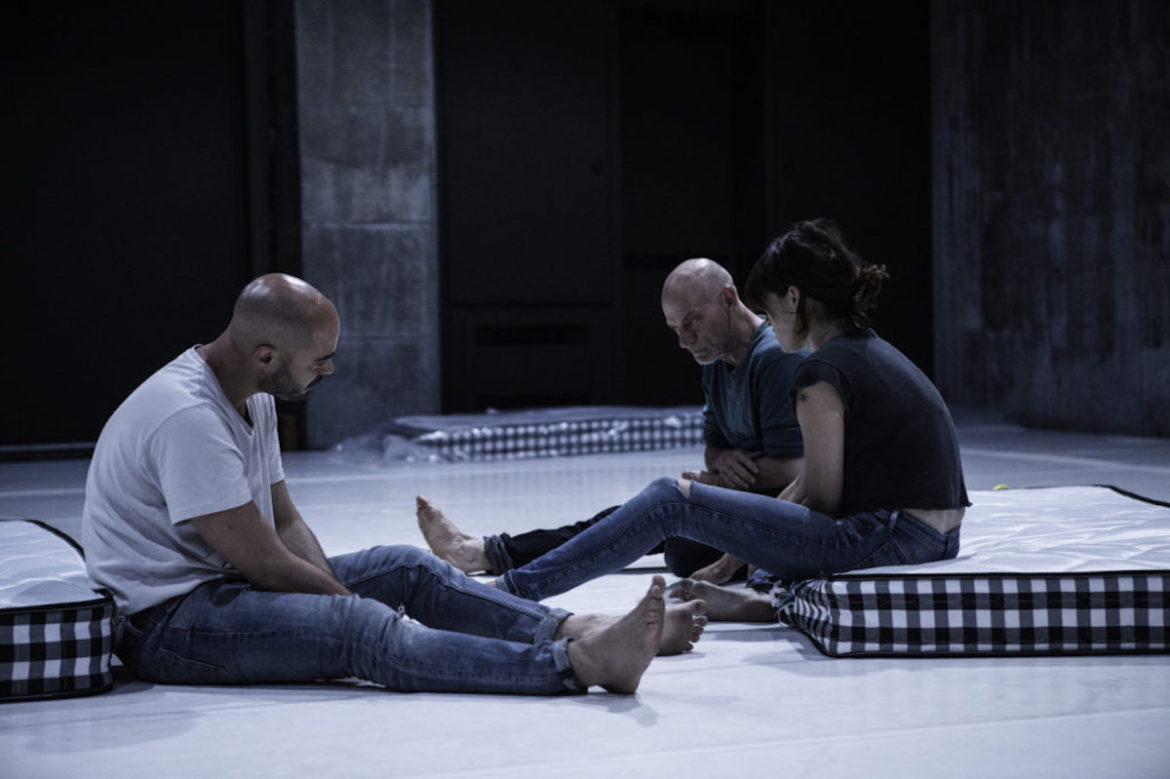Canadian First Nations choreographer Lara Kramer draws a surreal picture of colonised life in Windigo, says Philipa Rothfield
Windigo by Lara Kramer, a Canadian choreographer of Cree, Ojibwe and Mennonite heritage, is about the post-colonial predicament of Canada’s First Nations peoples. Program notes make mention of Kramer’s return to her grandmother’s home in the Lac Seul Reserve in Ontario, referring to the violence inflicted upon the First Nations peoples of Turtle Island.
Clearly these issues are of concern to the choreographer. And yet you could experience this work without thinking about any of these things. What’s very clear is that Windigo is predicated upon a bleak and unforgiving world. The show is a surreal depiction of an eviscerated culture. We are witness to that which is left.
We enter a large space bathed in indiscriminate, white light. A pile of clothes is strewn in one corner, plastic wrapping in another. There is nothing contrived about this tableau. It looks arbitrary, desolate. Two men and a woman cluster around a couple of mattresses. No one acknowledges the audience nor, in fact, each other. The space feels abject, time indifferent to the lives of these people.
The woman withdraws to a table of laptop and sound controls. She becomes a watcher, observing the activities of the two men. Not much happens. No one is in a rush to do anything. There is a feeling that there isn’t much to do. One man pulls out a pocket knife and works his mattress, penetrating its surface, rupturing the integrity of its fabric. A sound track accompanies these gestures, comprised of exaggerated crackling sounds and, later, the voice of a child. These sounds run parallel to the action. Nothing is integrated.
The mattress is an object, a means of existence which the men attempt to manipulate – pulling it along, bouncing it on the floor, throwing it against the wall. The mattress, whatever it stands for, is all these men have, apart from a pocket knife and a length of string. One man uses the string to pull the mattress along, a resistant dog on a frayed lead. He works hard to get the mattress to cooperate. It doesn’t. They are an unhappy match.
There is nothing comforting about these objects. If they could speak, they would be hostile. There is no love lost between the two men either. When one withdraws to dress and undress by means of the various items of clothing in the corner, the other pushes him face down, using his body weight to keep him down. And yet, even this, the aggression of one man towards another, is unfocused. It would be overstating the case to say that there is a relationship between these two, although they occupy the same world.
One man works a bouncy pink toy all around the room, the only feminised element in this field of alienated masculinity. He takes care to ensure the toy bounces up and down, carving a pathway through the detritus of the room. The man with the clothes now stuffs them into his mattress, which opens like a wound to accommodate these items. He now inserts himself into this opening, becoming one with the mattress, mostly inside but partly outside, limbs protruding.
Until now, the world of Windigo has been an exteriority, a surface to be interpreted; but now the boundary between inside and outside is troubled. It shifts. The man becomes an object which, for its part, becomes alive. At the same time, a number of small objects appear: cultural objects which are wrapped in plastic and placed in a row, commodified and inert.
The work is neither narrative nor emotive. There is a great deal of space within which to experience the work, to interpret its actions and elements. Its subtlety is at the same time its power to move its audience, who are themselves free to take up and experience the predicament of First Nations life after colonisation.
Philipa Rothfield is co-author of Practising with Deleuze (Edinburgh University Press, 2017). She is Creative Advisor at Dancehouse, Co-editor of the Dancehouse Diary, and Professor of Dance and Philosophy of the Body (honorary) at the University of Southern Denmark. She is also member of the Green Room dance awards panel.
Windigo, choreography, set, sound and costume design by Lara Kramer. Sound editing by Lara Kramer and Marc Meriläinen, lighting designby Paul Chambers. Dancehouse as part of Yirramboi Festival. Closed.

